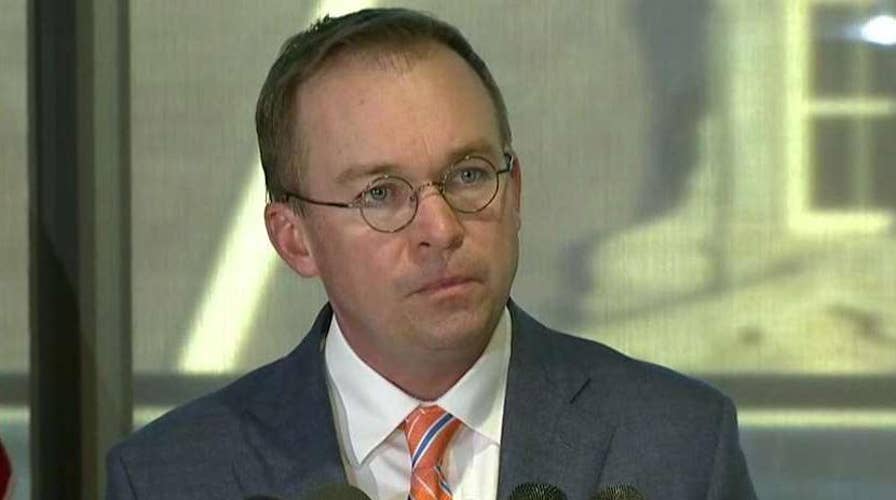Mulvaney announces hiring, regulation freezes at CFPB
Mick Mulvaney speaks amid battle over leadership at Consumer Financial Protection Bureau.
President Trump’s pick to lead the Consumer Financial Protection Bureau seized the reins of the agency Monday morning amid a heated battle over who's in charge, firing off a memo instructing staff to disregard directives from a rival official.
That official, Leandra English, was named deputy director by the outgoing Obama-appointed head of the bureau, putting her in line for acting director. She is currently suing the White House over Trump's decision to instead install his budget office boss, Mick Mulvaney, to the post.
As the case headed to court, both Mulvaney and English reported to work at the CFPB. But Mulvaney sought to leave no doubt who's in charge.
“[I]t has come to my attention that Ms. English has reached out to many of you this morning via email in an attempt to exercise certain duties of the Acting Director. This is unfortunate but, in the atmosphere of the day, probably not unexpected,” he wrote.
“Please disregard any instructions you receive from Ms. English in her presumed capacity as Acting Director. ... If you receive additional communications from her today in any form, related in any way to the function of her actual or presumed official duties (i.e. not personal), please inform the General Counsel immediately.”

Mick Mulvaney is asserting control over the CFPB. (AP)
Reuters, which first obtained the memo, reported that he sent the memo after English sent an email welcoming staff back from their Thanksgiving holiday and signed off as “acting director.”
The extraordinary battle over who will lead the federal government’s top consumer financial watchdog began Friday after former director Richard Cordray announced his resignation eight months ahead of schedule.
Cordray named English as his temporary successor, but Trump said it was his decision who would run the agency and named Mulvaney.
Late Sunday, English filed a lawsuit to block Trump’s choice to lead the agency that was created by the Obama administration six years ago and designed as a key regulatory check against big business.
It oversees a variety of financial products including mortgages, bank accounts and student loans.
“The President’s attempt to appoint a still-serving White House staffer to displace the acting head of an independent agency is contrary to the overall statutory design and independence of the bureau,” English wrote in her lawsuit.
Mulvaney -- who has a history of hostility toward the bureau and at times has called it a “sad, sick” joke and even supported legislation that would eliminate it -- reportedly showed up for his first day with a big box of Dunkin' Donuts.
In his office memo on Monday, he even encouraged employees to "stop by the fourth floor to say hello and grab a donut."
He later told reporters he had a “good, really smooth morning” at the bureau. Asked about the memo to workers, he said he wanted to “make it clear” they didn’t consider English to be acting director.
The White House said Monday it is “aware” of the English suit, but cited an opinion in their favor from the bureau’s own general counsel and said “the law is clear.”
“Now that the CFPB’s own General Counsel - who was hired under [outgoing director] Richard Cordray - has notified the Bureau’s leadership that she agrees with the Administration’s and DOJ’s reading of the law, there should be no question that Director Mulvaney is the Acting Director,” White House Press Secretary Sarah Sanders said in a statement. “It is unfortunate that Mr. Cordray decided to put his political ambition above the interests of consumers with this stunt. Director Mulvaney will bring a more serious and professional approach to running the CFPB.”
The White House also cited an opinion issued Saturday by the Justice Department's Office of Legal Counsel saying it is within the president’s right to appoint an acting director. Steven A. Engel, newly confirmed head of the office, wrote that while the deputy director could serve as acting director under the statute, the president has the power to make appointments under the Vacancies Reform Act.
But English argues that the Dodd-Frank Act, a law championed by Democrats that created the Consumer Financial Protection Bureau, prohibits the White House from naming the director for the agency.
Republicans and Democrats have long been at odds over the agency – and its former head. Republicans argue Cordray has tried to stifle business growth and opportunities.
On Saturday, Trump vowed – via tweet – to bring the agency “back to life” and criticized Cordray’s leadership. The president also instructed his followers to read a recent editorial in the Wall Street Journal “about what a complete disaster the @CFPB has been under its leader from previous Administration, who just quit!”
Trump has promised to install a more business friendly leadership and as acting director, Mulvaney would have full authority to implement changes at the bureau.
A new director must be confirmed by the Senate.
Fox Business Network's Blake Burman and The Associated Press contributed to this report.





